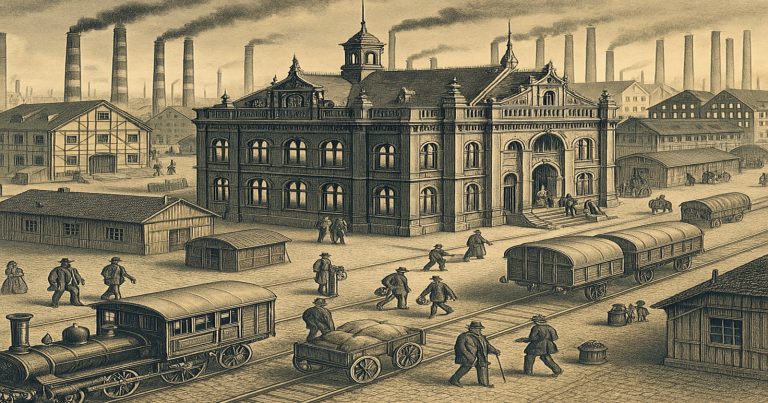The Zollverein was a milestone toward Germany’s eventual economic and later political unification. This free-trade customs union, formed at the onset of the 19th century, was equally important for both free trade. To encourage regional economic cooperation between the German states within the region. The internal tariffs were abolished. A standard external tariff was established to pave the way for industrialisation and modernisation in Germany’s economy. Not only did the union facilitate trade within the German Confederation. It also paved the way for the unification of Germany under Prussian leadership.
What is Zollverein?
The Zollverein was an alliance of German states that came into existence to regulate their customs and economic policies within their jurisdictions. At its core, it was merely a customs union aimed at eliminating all possible barriers to trade while ensuring uniform tariffs across the member states. For several decades before the advent of Zollverein, Germany was divided under the German Confederation, with every state constructing its tariffs alongside its borders, thereby hindering international trade and the general economy.
The Zollverein economically integrated all these states by abolishing internal tariffs, creating a large free-trade area within the German territories, and establishing uniform customs laws. This facilitated the modernisation of the economies of the German states, the promotion of industrial development, and their political reinforcement.
When and Why was the Zollverein Formed?
The Zollverein was established in 1834, with the Kingdom of Prussia at the helm. Its main aim was to eliminate the customs barriers and clearances that had impeded trade among the German states. At that time, Germany was fragmented into over 30 independent states, all of which had their own customs rules, which made trade cumbersome and slowed economic development.
Why was the Zollverein formed?
- Economic Growth: The old customs system was fragmented, and interstate trade with other German states was burdensome and often unproductive, preventing any real impetus to economic growth. The Zollverein fostered free trade among the contracting member states by standardising customs laws, impeding the commerce and industrialisation that were to follow.
- Prussian Influence: Prussia wanted to further its influence over the German states and viewed Zollverein as an instrument in exerting its leadership. In driving the customs union, Prussia aimed to economically bind the German states together, which eventually helped it to bind them under its political leadership.
- Industrialisation: The Zollverein would also further the industrialisation process, since a larger market combined with eliminating trade obstacles would be ensured. Because of this, coal mining, textiles, and many other manufacturing industries began to develop throughout the German territories.
- External Competition: The Zollverein was established to provide a single economic front against powers like Britain and France, who dominated world trade. A unified tariff system helped German states penetrate international markets more effectively.
What were the Advantages of the Zollverein?
The benefits of Zollverein were extensive, reaching into the economic and political fabric of Germany:
- Free trade zone: A primary advantage of Zollverein was the construction of a large free-trade zone in the German states. This has allowed the free movement of goods and services within the union, promoting economic interdependence and enhancing trade.
- Uniform Tariffs: The Zollverein allowed for a uniform system of tariffs. Overall, the customs became much easier and cheaper to trade in with unified tariffs. With the unification of tariffs, the member states experienced uniformities of imports where their tariffs standardised; their home industries are protected while free trade exists internally in the union.
- Industrial Growth: Abolishing internal trade barriers helped accelerate industrial growth in the German states. Because now, industries could sell their products freely in any part of the Zollverein region, it encouraged greater investment in infrastructure, especially in railways, coal mines, and factories.
- Economic Modernisation: The Zollverein was an instance of economic modernisation in Germany. It generated a single integrated economic area, propagated new technology, created productivity, and helped create a competitive industrial economy.
- Political Unity: Although an economic arrangement, the Zollverein paved the way for political unity among the German states. The idea of a unified German nation under Prussian leadership became more palatable when economic cooperation began with the Zollverein.
- Increased Income in States: Zollverein was able to help its member states earn income through a standard tariff system. The income earned was then distributed among the states according to their population size. This created greater economic benefits even for smaller states.
What was the Main Function of the Zollverein?
The primary function of the Zollverein was to eliminate internal customs barriers between the German states and create a unified external tariff for goods entering the Zollverein area. Its primary goals were:
- Facilitate Trade: The Zollverein was designed to be an instrument that eased trade by abolishing internal tariffs so that goods could move from one member state to the other freely, with no customs duties on their way, to encourage domestic trade.
- Standardising Tariffs: Zollverein shielded its members from external competition through a uniform outer tariff. Such a tariff system was most effective in textiles and manufacturing, which needed protection from dominating industrial powers such as Britain and France.
- Promote Economic Cooperation: The Zollverein encouraged economic cooperation and interdependence among the member states. The German states’ achievement of an integrated economic interest led toward political unity.
- Promote Industrialisation: The other significant role was supporting industrialisation by ensuring that goods were made to flow freely across the German states. This kind of encouragement also bred infrastructure, roads, and railroads, all accelerating economic growth.
- Promote Prussian leadership: The Zollverein was also a political tool of Prussia, and its leadership in the customs union became the tool to extend its influence over the small German states. That would be the critical step towards Prussian leadership in Germany’s unification in 1871.
Zollverein FAQs
1. What was the Zollverein?
The Zollverein was a customs union formed in the early 19th century among German states, led by Prussia, to eliminate internal tariffs and promote economic unity.
2. When was the Zollverein established?
The Zollverein was officially established in 1834, although efforts began earlier in the 1820s, gradually bringing together various German territories under a standard economic policy.
3. Why was the Zollverein significant for German unification?
The Zollverein laid the groundwork for political unity by fostering economic integration. It strengthened Prussia’s leadership and reduced Austria’s influence in German affairs.
4. How did the Zollverein impact trade and industry?
By removing internal tariffs and standardising trade laws, the Zollverein boosted domestic trade, increased industrial growth, and encouraged infrastructure development, especially railways.
5. Did all German states join the Zollverein?
Most German states joined over time, but Austria notably remained outside the union. This exclusion played a key role in shaping the political future of unified Germany under Prussian dominance.


